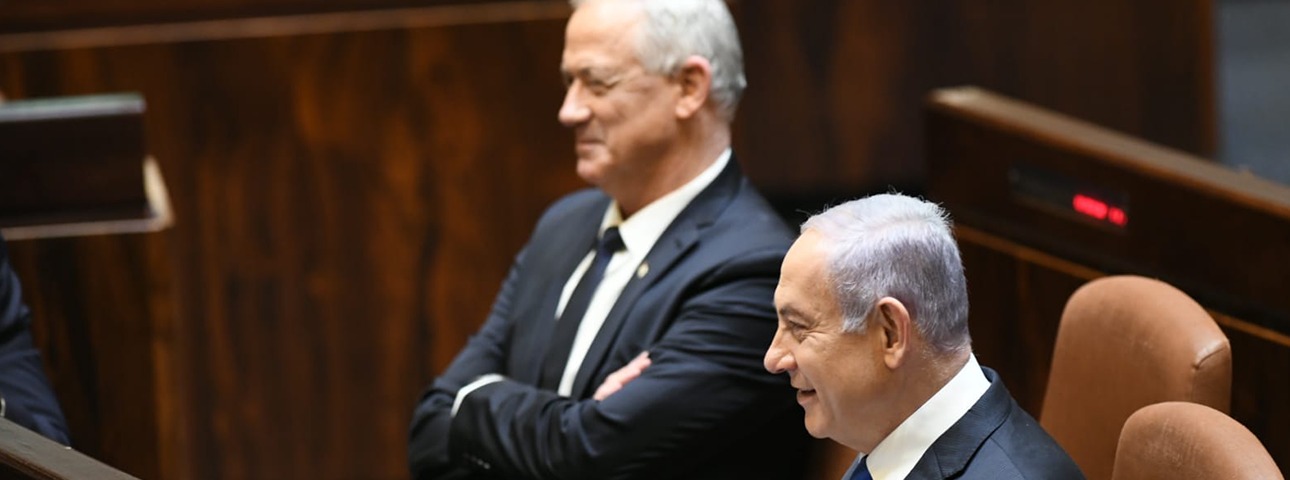Israel’s Cease-Fire Government Should Promote Healing, Not Division
Netanyahu and Gantz could use their unity government to put in place a 'democratic ceasefire' and speed Israel’s economic recovery rather than entrenching political deadlock.

Flash 90
Israel’s 18-month political nightmare—including three election campaigns—is finally over. While many challenges lie ahead, the new government sworn in on Sunday, led by Prime Minister Benjamin Netanyahu and his former rival Benny Gantz, now in the role of “alternate prime minister,” received an impressive 73 votes in Israel’s Knesset, providing it with a wide base that will hopefully lead to political stability.
Both sides reneged on major campaign promises when they agreed to form this government, arguing that now was the time for compromises and a cease-fire on the country’s divisive religious and cultural battles. The new government has a choice: to seize the opportunity to pursue policies regarding issues on which widespread consensus already exists in Israel or they can turn the cease-fire government into the continuation of political deadlock by other means.
It will not be easy for this government to succeed. A coalition co-led by a prime minister on trial for corruption and a retired general who vowed to preserve the rule of law while repeatedly seeking to unseat his rival, whom he labeled as corrupt, faces significant obstacles.
After entering politics in December 2018, the No. 1 priority for Gantz was to ensure that Netanyahu, if indicted, would not continue to serve in office. This pledge by Gantz’s Blue and White party intensified throughout the campaigns as Netanyahu’s indictments on bribery charges were officially handed down, and it served as a rallying cry to unite a previously divided opposition. Gantz was the law and order candidate vowing to return good governance and impeccable ethics to the prime minister’s office in Jerusalem.
In addition to his promises to fight corruption and clean up Israel’s public services, Gantz also articulated the ideology of the political center on a number of socioeconomic matters. He called for a fairer distribution of government resources in a country where interest-group competition often dictates state budgets. He also advocated more equitable burden sharing—as opposed to the current reality where members of the ultra-Orthodox community are exempt from the compulsory military service performed by most other Israelis.
Gantz envisioned a realignment of the balance between religion and state in a country where an Orthodox rabbinate holds a monopolistic grip over births, marriages, and burials and has the final say on matters such as public transportation and the opening of shops on Saturdays (the Jewish Sabbath).
Netanyahu also had high hopes for his agenda when he dispersed the Knesset back in December 2018. Had he achieved the necessary 61-seat majority for his right-wing bloc in parliament, Netanyahu intended to lead a radical overhaul of the country’s constitutional system by seeking personal immunity from prosecution while allowing political appointments in sensitive legal positions now filled by career civil servants. Most significantly, Netanyahu and his allies were intent on instituting a so-called override clause to inhibit the Supreme Court’s ability to exercise judicial oversight over Knesset legislation and other government policies. Judicial review has long been considered an essential element of the balance of powers in Israel’s democracy.
Netanyahu also intended to advance his agenda vis-à-vis the Palestinians by enacting a number of clauses in the Trump administration peace plan that would allow Israel to extend its sovereignty in disputed territories in the West Bank. Throughout the three elections, Netanyahu repeatedly pledged to move forward with such an annexation of land if and when he achieved an electoral victory while ignoring the parts of the plan that called for the establishment of an independent Palestinian state.
Both sides fell short of a commanding majority in three successive elections and, to avoid a fourth vote, have now agreed to a power-sharing agreement. The composition of Israel’s new government, however, makes it highly unlikely that any of the above policies proposed by Netanyahu or Gantz will be enacted. In fact, to overcome the significant distrust between the two main coalition partners, the coalition agreement they signed includes a number of clauses that ensure that neither side can pass legislation or push new government policies without the other’s consent.
In practice, this means that the government will most likely be paralyzed, with Netanyahu and Gantz wielding veto power over each other. Put simply, the most likely outcome will be deadlock, this time from within the cabinet rather than at the polls.
The article was published in Foreign Policy.
